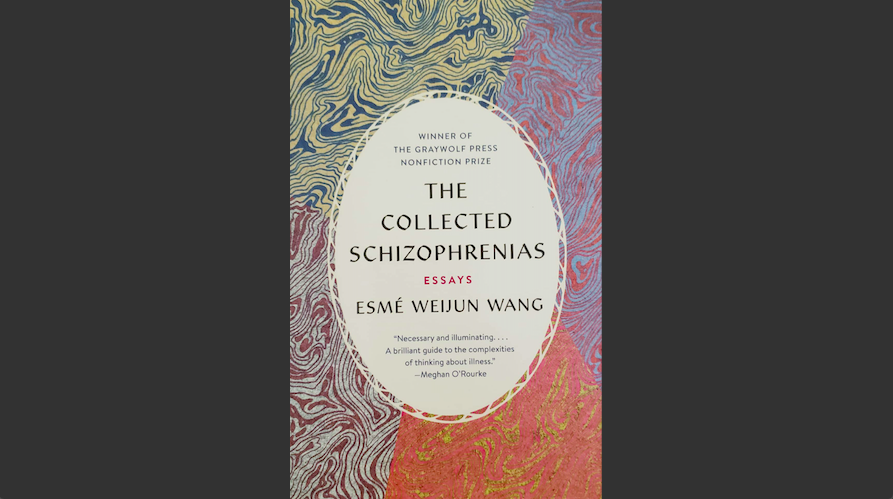On the outside, Esmé Weijun Wang seems to have a normal, regular life. A graduate of Sandford with a keen eye for fashion, her 2016 novel, The Border of Paradise, made her the recipient of Granta’s Best of Young American Novelists award. Wang comes from a hard-working family of Asian background and previously attended Yale University, where she met her husband. She seems to have a perfect life, or a least, a successful one. But inside her mind, Wang constantly struggles with hallucinations, delusions, feelings of loneliness, and depression. It is because of this complex profile that her latest book (now a certified New York Times Best Seller), The Collected Schizophrenias: Essays, is an exhilarating and thoughtful book about what it means to live with schizophrenia and the cruel twists for those who suffer from mental health issues.
The Collected Schizophrenias by Esmé Weijun Wang
From College to Schizophrenia
Weijun Wang’s new book is a thrilling and sometimes chaotic ride through her many battles with mental illness, specifically schizoaffective disorder. She welcomes us through her writing to a wide range of topics on mental health while recounting episodes of her life. In one essay, she will have you examining the frustrating new definitions on schizophrenia by the Diagnostic and Statistical Manual of Mental Disorders (or DSM V). In another, she takes us back to when she was accepted to Yale and when her first schizophrenic episode happened. Moreover, the structure of these essays jumps back and forth on the rich experiences that she perceives – especially hallucinations and delusions – through her mental disorder, the limits in life that she has accepted, and her search for answers.
The tales told by Weijun Wang get more complex and heartbreaking when advancing through this book. The first moments of sadness come when she explains her first episode (schizophrenic) and her exit from Yale. “I left Yale for good in early 2003, although I did not know at the time that it was the end,” Wang notes in her essay “Yale Will Not Save You.” She then tells us the cruel procedure that the university made her go through: “Yale told me to leave immediately. I was not allowed to reenter campus, and someone confiscated my student ID, and my busy father, who had flown from China to be with me, was tasked with packing my things.” As Wang explains later, the university wasn’t ready for her mental illness; or, more accurately, they were unprepared and cruel in their decision. Even when Wang’s episodes stopped and her therapists would give her positive feedback and letters for possible readmission, Yale decided not to readmit her.
The Heredity of Mental Illness
Wang struggles with multiple topics in regards to her future. Her brilliant essay, “The Choice of Children,” as Rachel Comb of The New York Times explains, is arguably the best writing of the book. In here, Wang offers her experience as a volunteer in a summer camp with children suffering from bipolar disorder. Wang fights with the reality of the heredity of mental illness, parenthood, and family, among other topics. She evaluates her moments of insight while handling a group of kids that she oversees, which gives her some occasions of hope, and in others, relief (this comes in the form of her bonding with a kid from a summer camp). She then finishes by stating:
“For all my fears about constantly watching over a child with mental illness, or any other severe disability, the very reasons that I thought I didn’t want children might be the ultimate factors that would end up changing my mind. I was surprised by my love for Stuart. He was smart and hilarious and knew a lot of fascinating trivia. He and I also shared a diagnosis [schizophrenia and bipolar respectively], and perhaps that, most of all, is why I had patience for his tantrums and oddities. ‘We could have a child like that,’ I said – and indeed, we could.”
Last Word on The Collected Schizophrenias by Esmé Weijun Wang
A rich turn of events is the high point of The Collected Schizophrenias. Wang can’t help herself to jump back and forth from memories, afflictions, and even sad tales. In the process, Wang opens about rape, the role of asylums, the sadness of not knowing what’s real and the perceptions from the public about those who suffer from mental illness. This book follows the footsteps of many personal memoirs that open-up about mental illness and its impact on life. When ending this book, one cannot help themselves in comparing Wang’s masterpiece with Kay Redfield Jamison’s An Unquieted Mind, Elyn R. Saks’ (another Yale graduate that suffers from schizophrenia) The Center Cannot Hold, and Susannah Cahalan’s Brain on Fire.
The Collected Schizophrenias: Essays by Esmé Weijun Wang
202 pp. Graywolf Press. Paper, $16.

